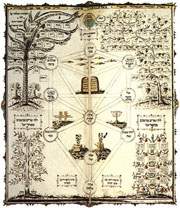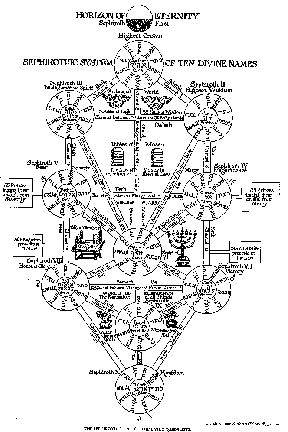Spring 2000 Prof. Mary Suydam
Office: Ascension 302
Office Hours T - Th. 10-12
PBX 5655

Mysticism, Magic, and Kabbalah in Judaism
| Religion 92, section 02 Spring 2000 Prof. Mary Suydam Office: Ascension 302 Office Hours T - Th. 10-12 PBX 5655 |
 |
Required Books:
Blumenthal, David. Understanding Jewish Mysticism, vols. 1 and 2. NY: KATV Publishing.
Dan, J., and Keiner, P., trans. Early Kabbalah. NY: Paulist Press.
Holtz, Barry, ed. Back to the Sources. Boston: Beacon Press.
Martin, Luther. Hellenistic Religions. NY: Oxford University Press.
On Course Reserve:
Idel, Moshe. Kabbalah: New Perspectives.
Jonas, Hans. The Gnostic Religion.
Scholem, Gershom. Major Trends in Jewish Mysticism.
Course Requirements
All students will write 1-2 page papers each week to aid in preparing for discussions of the texts. Ongoing interpretation of mystical texts is an important part of this class. Active participation in discussions is a critical component of grappling with the texts. Missing more than two classes or two weekly papers will lower your final grade by one full point (B becomes C, for example).
Midterm and final exam questions will be given in advance. The final exam will
be take-home and will be due on the day of the scheduled final exam. The final exam must be typed and double-spaced and will not exceed 5 pages.
Each student will select an aspect of the Jewish mystical tradition (e.g., the attitude towards Torah in the Zohar; female God-language, the Merkebah vision of God), explain it clearly, and relate it to the Jewish religious tradition: is there tension between the traditions, or does this aspect of Jewish mysticism evolve naturally from the rabbinic tradition? This is an opportunity for students to demonstrate their ability to understand, analyze, and write clearly about a facet of Jewish mysticism that interests them. Each student is expected to discuss his or her topic with the instructor no later than February 15, 2000. Papers will not exceed 7 pages and must be typed and double-spaced. The paper is due the last day of class. NO LATE PAPERS!
Topics
|
Week 1: The Roman World Mon. Jan 17: What is Jewish mysticism? Wed. Jan. 19: The late Roman world Fri. Jan. 21: Discussion: The late Roman religious world -----Readings: Luther Martin, Hellenistic Religions, introduction and chaps. 1 and 3 |
|
|
Week 2: The Jewish World Mon. Jan. 24: The early rabbinic period: The Mishnah Wed. Jan. 26: Jewish Biblical interpretation: Midrash Fri. Jan. 28: Discussion: Mishnah and midrash -----Readings: Handout: sections of Mishnah and midrash Holtz, Back to the Sources, chapter 1 Week 3: Gnostic World Views Mon. Jan. 31: Judaism and Gnosticism Wed. Feb. 2: Archons, divine sparks, and the pleroma Fri. Feb. 4: Discussion: gnosticism -----Readings: Handout: The Hypostasis of the Archons |
|
|
Week 4: Magic and the Roman World Mon. Feb. 7: Divination Wed. Feb. 9: Feminine powers fri. Feb. 11: Discussion: Jewish magic -----Readings: Martin, Hellenistic Religions, chapters 2 and 5 Handout, The Sefer HaRazim |
|
|
Week 5: Merkavah Mysticism Mon. Feb. 14: Thrones, chariots, and the vision of God Wed. Feb. 16: Magic and revelation in merkevah texts Fri. Feb. 18: Discussion of the merkevah -----Readings: Blumenthal, Introduction to Jewish Mysticism, vol. 1, 47-91 |
|
Week 6: The Shi'ur Qomah and the Sefer Yetsirah
Mon. Feb. 21: God's body: rabbinic and mysticalJudaism
Weds. Feb. 23:Creation and Speech
Fri. Feb. 25: Discussion: God's body, God's Speech
-----Readings: Scholem, Major Trends in Jewish Mysticism, 41-79 (Course Reserve)
Handout: excerpts from the Shi'ur Qomah
Blumenthal, Understanding Jewish Mysticism, vol. 1, 5-46
|
Week 7: Talmudic Judaism Mon. Feb. 28: The Talmudic Period Wed. Mar. 1: Judaism in the Christian and Islamic Worlds -----Readings: Holtz, Back to the Sources, chapter 2 Fri. Mar. 3: MIDTERM |
|
-------------------------------------SPRING BREAK--------------------------------------
III Early Kabbalah
|
Week 8: Judaism in the Middle Ages Mon. Mar. 20: The medieval Jewish world Wed. Mar. 22: Plotinus and Neoplatonism Fri. Mar. 24: Discussion: Medieval Bible Commentary -----Readings: -----Readings: Holtz, Back to the Sources, chapters 3 and 4 |
Week 9: The development of Kabbalah, 1100-1300
Mon. Mar. 27: The Bahir
Wed. Mar. 29: Isaac the Blind and the Gerona mystics
Fri. Mar. 31: Discussion, early Kabbalah
-----Readings: Early Kabbalah, 28-31, 57-69 (the Bahir), 31-36, 73-86, 89-96, 109-132
IV Kabbalah
|
Week 10: The Zohar Mon. Apr. 3: Moses de Leon Wed. Apr. 5: The cosmic system Fri. Apr. 7: Discussion: Ein-Sof and Sefirot; the Jewish concept of God -----Readings: Blumenthal, Understanding Jewish Mysticism, vol. 1, 103-119, 121-125 Week 11: God, humans and actions according to the Zohar Mon. Apr. 10: The Zohar and evil Wed. Apr. 12: The human dimension Fri. Apr. 14: Discussion: the Zohar and humanity -----Readings: Blumenthal, Understanding Jewish Mysticism, vol. 1, 126-139, 141-157 Holtz, Back to the Sources, chapter 6, 305-340 |
 |
|
Week 12: Abraham Abulafia Mon. Apr. 17: Ecstatic Kabbalah: Through a Mirror that Shines Wed. Apr. 19: Visualization and Speech in Abulafia Fri. Apr. 21: Discussion: Jewish mystical techniques -----Readings: Blumenthal, Understanding Jewish Mysticism, vol.2, 3-25, 37-81 Moshe Idel, Kabbalah: New Perspectives, chapter 5 (Course Reserve) |
|
|
Week 13: Jewish gnosticism revisited: Isaac Luria (16th century) Mon. Apr. 24: Isaac Luria' s interpretation of the Zohar Wed. Apr. 26: Repairing the breech: Kavannah Fri. Apr. 28: Discussion: Lurianic Kabbalah -----Readings: Blumenthal, Understanding Jewish Mysticism, vol.1, 159-184 and vol. 2, 111-127 |
|
|
Week 14: Hasidism and Kabbalah Mon. May 1: The origins of Hasidism Wed. May 3: The way of Devekut Fri. May 5: Discussion: Hasidic Prayer -----Readings: Blumenthal, Understanding Jewish Mysticism, vol.2, 127-147 |
|
Papers due last day of class